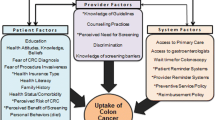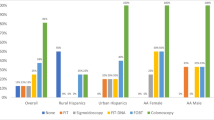Abstract
African Americans have higher colorectal cancer (CRC) morbidity and mortality than whites, yet have low rates of CRC screening. Few studies have explored African Americans’ own perceptions of barriers to CRC screening or elucidated gender differences in screening status. Focus groups were conducted with 23 African American patients between 50 and 70 years of age who were patients in a general internal medicine clinic in a large urban teaching hospital. Focus groups were delimited by gender and CRC screening status. Focus group transcripts were analyzed using an iterative coding process with consensus and triangulation to develop thematic categories. Results indicated key thematic differences in perceptions of screening by gender and CRC screening status. While both men and women who had never been screened had a general lack of knowledge about CRC and screening modalities, women had an overall sense that health screenings were needed and indicated a stronger need to have a positive relationship with their doctor. Women also reported that African American men do not get colonoscopy because of the perceived sexual connotation. Men who had never been screened, compared to those who had been screened, had less trust of their doctors and the health care system and indicated an overall fear of going to the doctor. They also reiterated the sexual connotation of having a colonoscopy and were apprehensive about being sedated during the procedure. Overall, men expressed more fear and were more reluctant to undergo CRC screening than women, but among those who had undergone CRC screening, particularly colonoscopy, men expressed advantages of having the screening. All groups were also found to have a negative attitude about the use of fecal occult blood testing and felt colonoscopy was the superior screening modality. Results suggest that messages and education about CRC screening, particularly colonoscopy, might place more emphasis on accuracy and might be more effective in increasing screening rates among African Americans if tailored to gender and screening status.
Similar content being viewed by others
References
American Cancer Society. 2009. Leading sites of new cancer cases and deaths—2009 estimates. http://www.cancer.org/downloads/stt/CFF2009_EstCSt_4.pdf. Accessed 12 January 2010.
American Cancer Society. 2009. Colorectal Cancer facts & figures 2008–2010. http://www.cancer.org/downloads/STT/F861708_finalforweb.pdf. Accessed 12 January 2010
Winawer S, Fletcher R, Rex D, Bond J, Burt R, Ferrucci J, Ganiats T, Levin T, Woolf S, Johnson D, Kirk L, Litin S, Simmang C (2003) Colorectal cancer screening and surveillance: clinical guidelines and rationale—update based on new evidence. Gastroenterology 124:544–560
Centers for Disease Control and Prevention (CDC). 2007. Behavioral risk factor surveillance system survey data. http://www.cdc.gov/brfss/. Accessed 12 January 2010
Greiner KA, Born W, Nollen N, Ahluwalia JS (2005) Knowledge and perceptions of colorectal cancer screening among urban African Americans. J Gen Intern Med. doi:10.1111/j.1525-1497.2005.0165.x
James AS, Campbell MK, Hudson MA (2002) Perceived barriers and benefits to colon cancer screening among African Americans in North Carolina: how does perception relate to screening behavior? Cancer Epidemiology, Biomarkers & Prevention: A Publication of the American Association for Cancer Research Cosponsored by the American Society of Preventive Oncology 11(6):529–534
Green PM, Kelly BA (2004) Colorectal cancer knowledge, perceptions, and behaviors in African Americans. Cancer Nurs 27(3):206–215
Ward SH, Lin K, Meyer B, Bass SB, Parameswaran L, Gordon TF, Ruzek SB (2008) Increasing colorectal cancer screening among African Americans, linking risk perception to interventions targeting patients, communities and clinicians. J Natl Med Assoc 100(6):748–758
U.S. Preventive Services Task Force (2002) The guide to clinical preventive services: report of the United States preventive services task force, 3rd edn. International Medical Publishing, Inc, McLean
Pignone M, Rich M, Teutsch SM, Berg AO, Lohr KN (2002) Screening for colorectal cancer in adults at average risk: a summary of the evidence for the U.S. preventive services task force. Ann Intern Med 137:132–141
Levin B, Lieberman DA, McFarland B, Andrews KS, Brooks D, Bond J, Dash C, Giardiello FM, Glick S, David Johnson C, Johnson D, Levin TR, Pickhard PJ, Rex DK, Smith RA, Thorson A, Winawer SJ (2008) Screening and surveillance for the early detection of colorectal cancer and adenomatour polyps, 2008: a joint guideline from the American Cancer Society, the US Multi-Society Task Force of Colorectal Cancer, and the American College of Radiology. Gastroenterology 134(5):1570–1595
American Cancer Society. 2009. Cancer Prevention and early detection, facts and figures. http://www.cancer.org/downloads/STT/860009web_6-4-09.pdf. Accessed 12 January 2010
Beeker C, Kraft JM, Southwell BG, Jorgensen CM (2000) Colorectal cancer screening in older men and women: qualitative research findings and implications for intervention. J Community Health 25(3):263–278
Holmes-Rovner M, Williams GA, Hoppough S, Quillan L, Butler R, Given WC (2002) Colorectal cancer screening barriers in persons with low income. Cancer Pract 10(5):240–247
Carcaise-Edinboro P, Bradley CJ (2008) Influence of patient–provider communication on colorectal cancer screening. Med Care 46(7):738–745
Katz ML, James AS, Pignone MP, Hudson MA, Jackson E, Oates V, Campbell MK (2004) Colorectal cancer screening among African American church members: a qualitative and quantitative study of patient–provider communication. BMC Public Health 4:62
Green C, Pope C (1999) Gender, psychosocial factors and the use of medical services: a longitudinal analysis. Soc Sci Med 48(10):1363–1372
Dolan NC, Rosario Ferreira M, Fitzgibbon ML, Davis TC, Rademaker AW, Liu D, Lee J, Wolf M, Schmitt BP, Bennett CL (2005) Colorectal cancer screening among African-American and white male veterans. Am J Prev Med 28(5):479–482
Friedman M, Borum ML (2007) Colorectal cancer screening of African Americans by internal medicine resident physicians can be improved with focused educational efforts. J Natl Med Assoc 99(9):1010–1012
O'Malley AS, Sheppard VB, Schwartz M, Mandelblatt J (2004) The role of trust in use of preventive services among low-income African-American women. Prev Med 38(6):777–785
Taylor V, Lessler D, Mertens K, Tu S-P, Hart A, Chan N, Shu J, Thompson B (2003) Colorectal cancer screening among African Americans: the importance of physician recommendation. J Natl Med Assoc 95(9):806–812
Palmer R, Midgette LA, Dankwa I (2008) Colorectal cancer screening and African Americans: findings from a qualitative study. Cancer Control: Journal of the Moffitt Cancer Center 15(1):72–79
Pope C, Mays N (2006) Qualitative methods in health and health services research. In Qualitative Research in Health Care, 1-11. Wiley-Blackwell, Malden
Friedman LC, Everett TE, Peterson L, Ogbonnaya KI, Mendizabal V (2001) Compliance with fecal occult blood test screening among low-income medical outpatients: a randomized controlled trial using a videotaped intervention. J Cancer Educ 16:85–88
McMullin JM, De Alba I, Chávez LR, Hubbell FA (2005) Influence of beliefs about cervical cancer etiology on Pap smear use among Latina immigrants. Ethn Health 10(1):3–18
Author information
Authors and Affiliations
Corresponding author
Rights and permissions
About this article
Cite this article
Bass, S.B., Gordon, T.F., Ruzek, S.B. et al. Perceptions of Colorectal Cancer Screening in Urban African American Clinic Patients: Differences by Gender and Screening Status. J Canc Educ 26, 121–128 (2011). https://doi.org/10.1007/s13187-010-0123-9
Published:
Issue Date:
DOI: https://doi.org/10.1007/s13187-010-0123-9




